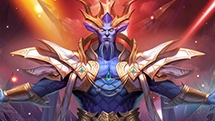by Ben Lamb, Onrpg writer
Gaming. To many people computer gaming will conjure up images of spotty-faced teenage boys spending hours alone in their rooms. Or lonely, over-weight, middle-aged men awake long into the night trying to beat that high score. But despite the persistence of this rather unfair view, computer gaming has been surreptitiously creeping towards a radically different position for quite a while.
Listen to the marketing hype from any of the recent consoles and one of the key words you will keep hearing is ‘community’. In the days of old, if you wanted to test your elite ninja skills against another human being then you had to actually maintain a friendship with somebody who shared your interest in high scores.
The consoles, however, are finally taking advantage of that endless stream of ones and zeros racing across our planet and are enabling us all to form these relationships. Often these relationships will last only as long as it takes for some piston-fingered freak halfway around the world to reduce your cunning strategies to a withering heap of inadequacy, but they have the potential for vastly more meaningful exchanges.
Bucket Full Of Dice
The PC, of course, has been well ahead of the curve when it comes to this interaction with other players. Particularly when it comes to the MMORPG. As far back as the early nineties, hundreds of players have been connected together in worlds such as Ultima Online, and the term ‘role-playing’ took on aspects never before explored.
Traditional role-playing games have been around much longer than their digital counterparts. Groups of (large, bearded, male) players would get together with a bucket-full of dice and a bunch of pencils, taking on the personae of their heroes and villains to varying degrees. This required a certain bravery on the part of the players though, and often a large degree of imagination (beer).
With the introduction of computers and the advent of persistent fantasy worlds it became far easier to slip on a character and loose oneself in another reality. Gamers could suddenly use these places to explore those characters they had inside them, those people they really wanted to be, and meet those characters presented by other people.
In an unprecedented fashion, these worlds quickly began to suck gamers in. They expanded the demographic, first to include middle-aged women, then slowly reaching out further to all ages. Gaming was becoming an increasingly social experience.
Beating Heart
Fast-forward a couple of decades and suddenly that social aspect is the beating heart of a gigantic industry. Most MMOs have never lost that core of traditional gaming but increasingly this is not what draws people to a game and not what keeps them there. Gamers want this social aspect. They want community. They need to form relationships. They crave the kind of interaction and challenge and reward that can only come from playing with other human beings.
Gamers who have been around long enough to remember the lonely old days will recall the exhilaration of those initial connections. The exciting comprehension that those characters on the screen were controlled by other players. Suddenly actions that were previously just a means to a goal became, in themselves, a communication with those around you. The medium became the message. These actions, however mundane the intention, betray a personality. Even without the obligatory chat-interface, gamers are quick to identify with each other and form real bonds.
As with the stereotypical image of gamers that certain people carry in their minds, many people seem intent to deride this kind of connection, claiming that it is not ‘real’. The people, the personalities that present themselves, are not the ‘real’ identities of the players, and thus any relationship borne of them is false. Even if the actions or words of a player were to be a true representation of the ‘real’ person behind it, any relationship abstracted so far from reality is patently meaningless. But we all know that isn’t true.
Invented Personalities
For many people role-playing is still essentially about playing themselves, albeit often a much more extroverted and confident version of themselves. The friendships that these people make can often run very deep and extend far outside their original setting. More than a few marriages owe their conception to a fantasy playground. There have been heart-warming stories dating back almost as far as the birth of the MMORPG scene itself, with them becoming so common now that they barely warrant a raised eyebrow.
For these people the MMOG is simply an extension of their social repertoire. Like talking on the phone or in a chat room, it is simply providing another medium for the natural social urges with which we are all pre-programmed. The more interesting examples come from those people who dive more deeply into their roles. Whilst many players see their avatars as natural extensions of their existing personality into other worlds, some seize this opportunity to create someone entirely new.
To those people who only ever play themselves, this can sometimes seem strange. These invented personalities are inherently social. They exist only in their interactions with other players. But why socialise, why make these connections, when the part of you making the connection isn’t the real you? More to the point, why connect with someone else when it’s not the real them? This can seem doubly absurd when you consider that these characters will mostly be meeting other ‘made up’ characters.
In It For The Story
These interactions still fulfill a basic human need, one that is doubtless as old as our need to be social. Storytelling. We all love a story, probably on a much deeper level then most people ever consider. Gaming (in MMOs) is all about story. Especially the RPG. Strip this away and you are left with almost nothing. Every quest, every NPC, every location is all story, and everyone wants to be a part of it. For some, simply being there is enough, but for others, the words “Hi, my name’s Steve and I’m an accountant from Iowa”, break that spell somewhat. Who wants to know more about Steve, when instead you could be hearing about what his wizard does for a living?
There is an unspoken agreement between these role players that you’re all in it for the story. Everyone brings their own character to the party and together you go on an epic quest. Any avid reader will know the huge attachment that can be formed with a fictional character. You really start to care about them, even characters that aren’t the hero. Likewise, the in-game relationship between two imaginary characters can be invested with huge amounts of emotional energy and become a vastly more real and important connection than those between other players.
The Line Between
The role-playing servers of these imaginary worlds are filled with the imaginary friendships of these role-playing gamers, and for most of them, this will always be the extent of their relationships. These relationships are not intended to reach any further than that. There will always be some like-minded fellows who make a connection outside of the game, but others would be terrified at the thought of such social proximity.
The line between a player and their character is always a difficult distinction to draw, especially as most characters are simply an extension of the player’s personality. Even with very specifically role-played characters, the question of how real their interactions are becomes very pertinent when they intrude on a real-life relationship. While generally content to see these on-line games as empty and meaningless, the stereotypical gamer’s girlfriend will be quick to jump into action should her partner look like he is misbehaving, and rightly so.
The answer as to where to draw the lines in these situations will never be a simple one. Affairs of the heart do not often allow such easy answers, but situations like these can help us understand these strange social creations which we call MMOs. I guess it all comes down to just how real a reflection of our inner characters we believe these avatars are. Is there room for these two personalities to live side by side? If so, is there room for two relationships? As technology improves, these worlds and their inhabitants become more real. Will there come a point where a life inside the game is a fair substitute for a life outside? The main argument against this is the lack of social interactions, but surely this argument is quickly becoming redundant. Will their come a point where these two worlds, these two social identities merge?
None of these are simple questions, and none should be taken lightly. The answers may seem obvious to some but, just as our perceptions on these matters has changed greatly in the past decade, they may well change even more in the decade to come.



